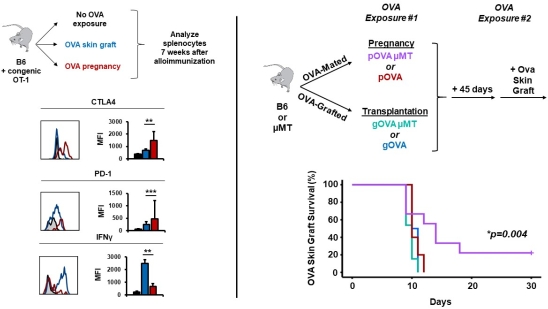Memory T Cell Dysfunction after Pregnancy Alloimmunization Prolongs Transplant Survival
1Surgery, University of Pennsylvania, Philadelphia, PA
2Medicine, University of Pennsylvania, Philadelphia, PA
3OBGyn, University of Pennsylvania, Philadelphia, PA
4Microbiology, University of Pennsylvania, Philadelphia, PA.
Meeting: 2018 American Transplant Congress
Abstract number: C286
Keywords: Graft survival, Pregnancy, Sensitization, T cells
Session Information
Session Name: Poster Session C: Lymphocyte Biology: Signaling, Co-Stimulation, Regulation
Session Type: Poster Session
Date: Monday, June 4, 2018
Session Time: 6:00pm-7:00pm
 Presentation Time: 6:00pm-7:00pm
Presentation Time: 6:00pm-7:00pm
Location: Hall 4EF
Background Pregnancy alloimmunization can preclude donor compatibility and may diminish transplant lifespan. While these consequences may be attributed to immunologic memory responses that endanger an organ transplant sharing HLA specificity with a prior pregnancy, it is unclear whether pregnancy alloimmunization results in canonical memory T cells that pose a threat to an allograft. Methods We used an OVA:OT-1 murine model to track fetal-specific maternal T cell responses in skin grafted parous mice. To determine whether the results of our murine model could be generalized to humans, we compared graft loss between pregnancy-alloimmunized vs. graft-alloimmunized kidney transplant recipients within the UNOS registry. This analysis included propensity score matching of female recipients of offspring kidneys (n=3,001) with recipients of a second haplotype-matched kidney that was HLA-identical to the first kidney donor (n=31). Results Fetal-specific maternal CD8+ T cells differentiate into CTLA4+PD-1+ cells during pregnancy that have limited capacity to produce cytokine (Figure, left). Skin graft survival was significantly prolonged in pregnancy- vs. graft-alloimmunized mice in the absence of anti-OVA antibody (Figure, right). Complementary analysis of the UNOS registry demonstrated superior graft survival in pregnancy-immunized kidney transplant recipients vs. recipients of a second haplotype-matched kidney that was HLA-identical to the first kidney donor [80% vs. 60% respectively at 10 years; p=.028]. Conclusion Pregnancy promotes the differentiation of CD8+ T cells that are distinct from canonical memory T cells and are permissive of prolonged allograft survival. Altogether, these data distinguish parous women from other alloimmunized populations and have broad implications for their clinical care, including choice of pharmacologic immunosuppression, donor selection, and overall access to transplantation. 
CITATION INFORMATION: Porrett P., Cohen J., Xu R., Lewis E., Elovitz M., Wherry E., Sawinski D. Memory T Cell Dysfunction after Pregnancy Alloimmunization Prolongs Transplant Survival Am J Transplant. 2017;17 (suppl 3).
To cite this abstract in AMA style:
Porrett P, Cohen J, Xu R, Lewis E, Elovitz M, Wherry E, Sawinski D. Memory T Cell Dysfunction after Pregnancy Alloimmunization Prolongs Transplant Survival [abstract]. https://atcmeetingabstracts.com/abstract/memory-t-cell-dysfunction-after-pregnancy-alloimmunization-prolongs-transplant-survival/. Accessed February 14, 2026.« Back to 2018 American Transplant Congress
